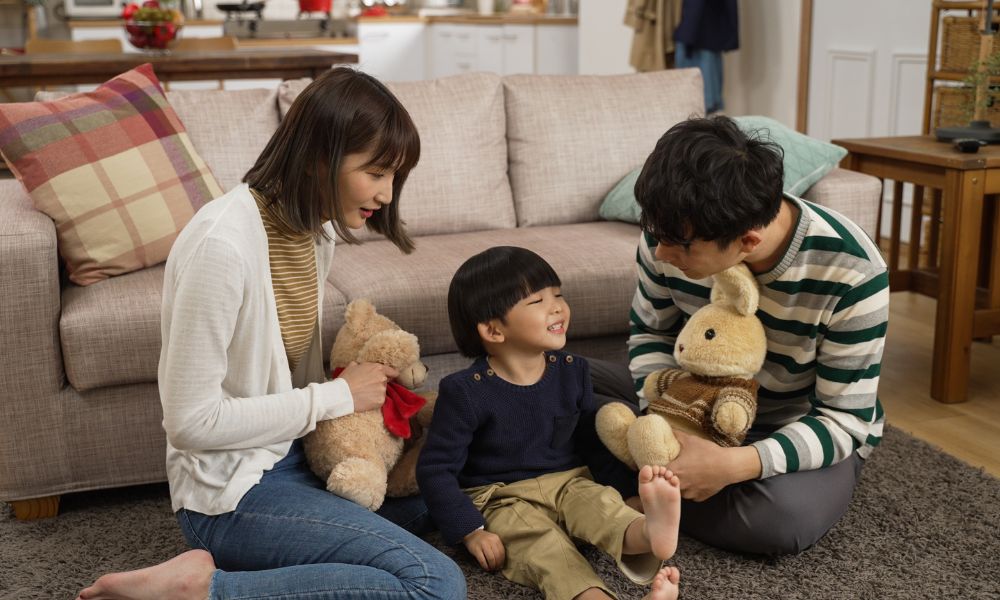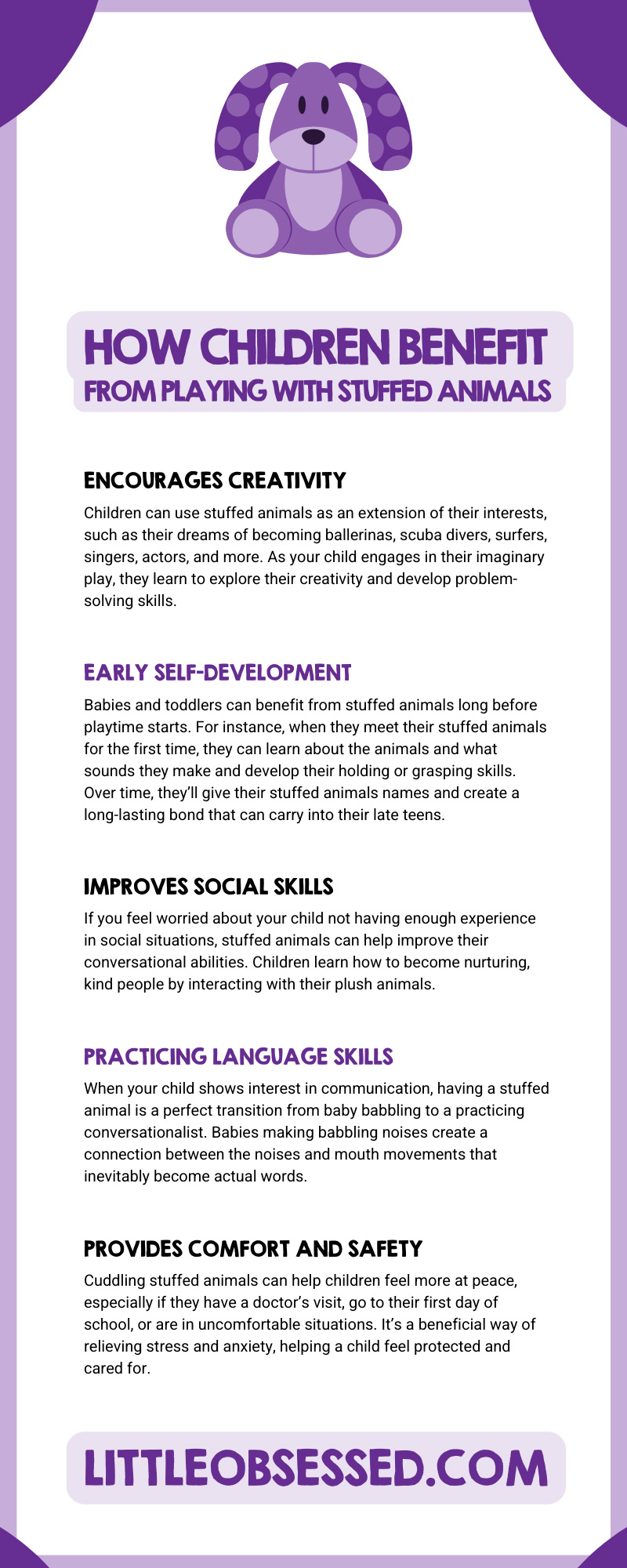How Children Benefit From Playing With Stuffed Animals
31st Mar 2023

As children grow, they seek safety and comfort in many forms. Whether it’s time spent in their parents’ arms or watching their favorite movie on repeat, children often rely on what makes them comfortable to flourish and become more confident. Because of this, toys and stuffed animals can benefit a child significantly, especially when a child is learning to socialize and express creativity.
So let’s discuss how children benefit from playing with stuffed animals and the different age ranges that considerably impact playing with adorable, fluffy critters. Of course, every child has a favorite animal to love, from fluffy bunnies to scaly dinosaurs.
Babies
When you have a baby, they love to touch the surfaces of stuffed animals. They can feel bristly whiskers, hard eyes, and soft fur; it gives them something unique to interact with and improves their dexterity. Furthermore, babies can chew or suck on their favorite stuffed animals, which helps develop their senses.
If your baby has a couple of favorite stuffed animals, ensure they’re well-designed toys that stand the test of time and can get washed on a regular basis. Also, avoid choosing stuffed animals that contain removable parts or tiny beads to prevent choking. Otherwise, squeaky toys with short hair and fur will make a perfect choice.
Toddlers
During the ages of 2 and 3, choose toys that offer safety and durability for long stretches of playtime. Toddlers begin to learn about empathy, along with name and language association. Animals such as cats, dogs, elephants, pigs, bears, and chickens can help toddlers recognize different words and understand the differences between them.
When a toddler gives their stuffed animal a name, a bond forms, and the toy becomes your toddler’s constant companion. Children explore different emotions with their stuffed animals, from throwing and hitting them to kissing and hugging them. Furthermore, toddlers practice their caregiving skills with stuffed animals, such as feeding them, changing their diapers, giving them naps, and sitting them on the potty.
Preschoolers
During preschool years, children learn to express their creativity and play imaginatively. Preschool children often go beyond a stuffed animal’s appearance by giving them titles as princesses, police officers, firefighters, jungle explorers, nurses, teachers, and more.
Preschool children use their stuffed animals to share feelings and create elaborate conversations about anything they can think of. Then, after having a hard day, children can come home to their favorite stuffed animals to snuggle and share their feelings with.
School-Aged Children
As your child reaches school age, they often take what they’ve experienced from the day and use stuffed animals to recreate scenarios they enjoyed or disliked. For instance, children can take a group of stuffed animals to create a classroom full of eager students or play a dance number they saw online. Children in their school years may still have strong bonds with their stuffed animals by sleeping with them at night or crafting different outfits and items for their next play session.
Older Children
Once your child transitions from single digits to their teens, stuffed animals might take on a different purpose. Your child might use them for display in their rooms, put them into storage, or donate them to someone in need. If you have a child who’s an animal lover, they may seek enjoyment in exotic or unusual animals such as reptiles, prehistoric creatures, and mythical beasts.
If your child still enjoys stuffed animals and includes them in their hobbies, taking them to zoos, museums, farms, and the countryside can expose them to new things. You can also take your child to zoology and biology events to deepen their appreciation for life.
Benefits of Playing With Stuffed Animals
Playing with stuffed animals has many benefits for children, such as encouraging creativity and seeking comfort. Let’s discuss how your child can benefit from stuffed animals during playtime.
Encourages Creativity
If there’s a significant benefit to owning stuffed animals, it’s an immense boost in creativity for children. Children often see beyond the ordinary and mundane, as they don’t set limits for their creativity in playtime. In addition, stuffed animals aren’t only pets; they can become something entirely different.
Children can use stuffed animals as an extension of their interests, such as their dreams of becoming ballerinas, scuba divers, surfers, singers, actors, and more. As your child engages in their imaginary play, they learn to explore their creativity and develop problem-solving skills.
Early Self-Development
Babies and toddlers can benefit from stuffed animals long before playtime starts. For instance, when they meet their stuffed animals for the first time, they can learn about the animals and what sounds they make and develop their holding or grasping skills. Over time, they’ll give their stuffed animals names and create a long-lasting bond that can carry into their late teens.
Improves Social Skills
If you feel worried about your child not having enough experience in social situations, stuffed animals can help improve their conversational abilities. Children learn how to become nurturing, kind people by interacting with their plush animals.
Parents can also partake in playtime by teaching vocabulary and communication lessons as children learn to socialize with their stuffed animals. Practicing emotions and responses while strengthening relationships are just a couple of ways your child can learn to communicate and understand others.
Practicing Language Skills
When your child shows interest in communication, having a stuffed animal is a perfect transition from baby babbling to a practicing conversationalist. Babies making babbling noises create a connection between the noises and mouth movements that inevitably become actual words.
Furthermore, parents can play with their babies by participating in a small, simple conversation to help encourage their little ones to talk. When toddlers observe older children and adult conversation, stuffed animals allow them to practice their communication skills.
Provides Comfort and Safety
After a long, stressful day, your child will want comfort and solace in something they enjoy. Owning stuffed animals helps them form bonds and friendships, perfect for snuggling and relaxing after a hard day.
Cuddling stuffed animals can help children feel more at peace, especially if they have a doctor’s visit, go to their first day of school, or are in uncomfortable situations. It’s a beneficial way of relieving stress and anxiety, helping a child feel protected and cared for.
Little Obsessed offers miniature toys, stuffed animals, activities, and more for every person who wants to enjoy their creative side. Our small toys are the perfect outlet for little ones who want a companion or activity on the go. If you know someone who would love one of our miniatures, visit us today for the perfect gift.

